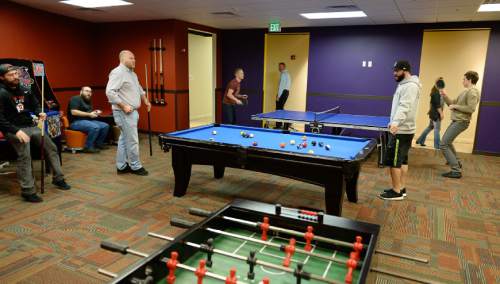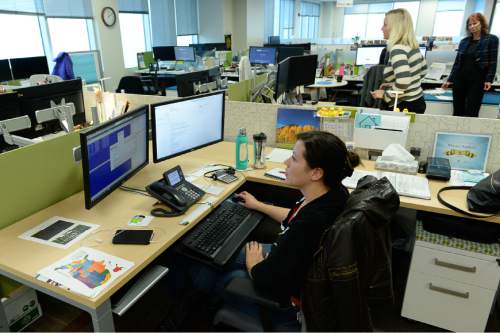This is an archived article that was published on sltrib.com in 2015, and information in the article may be outdated. It is provided only for personal research purposes and may not be reprinted.
CHG Healthcare Services' path to becoming one of Utah's best places to work began with failure.
The Cottonwood Heights-based company — which places physicians, nurses and other health professionals in jobs around the country — couldn't get its own employees to stay. Nearly half quit each year, and it meant CHG couldn't easily add more clients and grow. So leaders asked people why they were leaving and what they could do to stop the exodus.
What they heard more than a decade ago — and the actions they continue to take to this day — would lead to radical changes in how employees are treated, with the happy result that, today, turnover is down to around 19 percent and revenue has jumped tenfold, to $1 billion, according to the company.
And CHG employees continue to voice their opinions: They named their employer the best large company to work for along the Wasatch Front in a survey conducted for The Salt Lake Tribune by WorkplaceDynamics.
"In the journey of trying to lower turnover, we found [that] asking employees to get involved in the solution really was powerful," says Kevin Ricklefs, whose title as senior vice president of talent management is its own sign of how CHG is different.
Ricklefs says his job is to build the culture CHG now uses as a business strategy: putting people first.
That motto grew out of the conversations in 2001, when employees said they didn't feel cared for. Ever since, CHG has asked them annually how they would improve the workplace. Those ideas — which have grown to 200 pages of suggestions — have fueled everything from improved family leave to offering eight hours of paid time off for volunteer work to on-site health clinics free to staff and their families.
"We want to build a culture where employees have a voice," Ricklefs says, "and they're really part of helping us not only make decisions, but make decisions that affect their jobs."
He says leaders pore through the survey responses, find common themes and seek ways to implement them — even when they cost the company money.
For example, CHG encourages workers to create groups based on personal interests, whether it's a gun club, bike-racing group, RSL fan club or even a support group for employees fighting cancer. The company gives the groups, numbering around 30 with 800 participants, $500 a year to spend how they would like.
These network groups keep employees engaged at work.
If you have friends at work, "you're more willing to frankly jump out of bed and come to work," Ricklefs says. You tend to stay longer."
In the WorkplaceDynamics survey, employees frequently cite their colleagues for why they love their jobs.
"I love the people I work with; I believe I make a difference with the services I provide," one worker writes. "I truly feel that my leadership team cares about me."
The employee interest groups also reflect another company philosophy called "free to be me."
"Wear what you want to wear, be who you want to be, have fun in the ways you want to have fun," Ricklefs explains. "It isn't about who you are; it's about what you bring to the job."
In the anonymous survey, employees cited such values for why they nominated CHG. "I am who I am at home, in the community and work. I don't have to pretend to be someone different here," writes one. "I love the work/life balance and 'putting people first' attitude that is not only talked about, but strongly urged to live by."
Indeed, B.J. Martinez, a receptionist who has worked at the company for 29 years, says her job makes her a better person.
"Our corporate values, as far as putting people first, I try to think of that in my daily life," she says in an interview. When she's having an argument with a family member, "I have to think, 'Am I putting them first or myself first?' I need to step back and listen and put someone else first."
Martinez is happy to walk in the door every morning at 7. What she loves most is how CHG encourages her and her colleagues to serve others.
Besides giving one paid day a year for volunteering — Martinez helps at a food bank — CHG created a compassion fund in which employees can donate their time off and/or money to other workers in need. Some employee interest groups hold events to raise money for the tax-free compassion grants; 20 grants totaling nearly $30,000 were given to employees last year.
CHG also hosts a United Way week. Last year, the bake sales, auctions and pingpong and poker tournaments raised $400,000, including a company match, for the organization.
That event is one of 420 staged in CHG's seven locations last year. CHG has six full-time employees dedicated to events, from meetings and lunches to the grand Employee Appreciation Week (complete with daily giveaways, free massages, lunches and more).
Sure these perks cost money, but Ricklefs says they are being paid for with CHG's profits, which were made by treating employees well.
"We know if we create a great culture … people who work here tend to be more engaged, which means they're happy at work. Our turnover is 60 percent lower than the industry [standard]. We're about twice as productive.
"Our culture is really our business strategy." —
Top 5 large companies
2015
1 • CHG Healthcare Services
2 • Prestige Financial
3 • HealthEquity Inc.
4 • SelectHealth
5 • IHG-International Hotels Group
2014
1 • Nicholas & Co.
2 • USANA Health Services Inc.
3 • American Express
4 • Prestige Financial
5 • O.C. Tanner Co.
Source: WorkplaceDynamics













